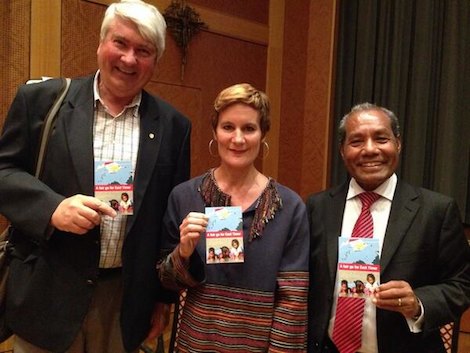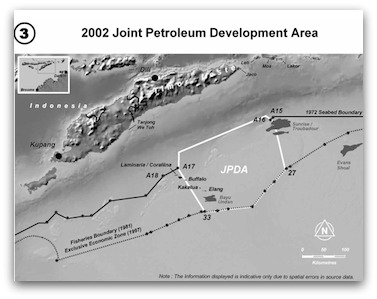Keywords: Alexander Downer
-

AUSTRALIA
- Paul O'Callaghan
- 20 June 2014
3 Comments
Pope Francis and Julie Bishop both spoke this week, with passion and within days of each other, about how to address poverty in the world's poorest countries. Bishop launched a framework of new performance benchmarks, and her desire to improve accountability and transparency in Australia's aid program is to be commended. Hopefully the framework holds the voices of the poor and marginalised at its centre.
READ MORE 
-

AUSTRALIA
- Frank Brennan
- 21 May 2014
10 Comments
In 2006 Australia and Timor Leste hastily signed the Treaty on Certain Maritime Arrangements in the Timor Sea (CMATS) at a time of considerable political instability in Timor. After last year's revelation of evidence of Australian spying on the Timorese during the negotiation of CMATS, the Timorese decided to challenge its validity, and in March this year they had a spectacular win in the International Court of Justice that caused great embarrassment to Australia.
READ MORE 
-

AUSTRALIA
- John Warhurst
- 04 March 2014
3 Comments
The general lessons from the conflict of interest that claimed Alastair Furnival, chief of staff to Assistant Health Minister Senator Fiona Nash, are about the often-hidden world of political insiders. The numbers of Coalition aligned lobbyists has grown greatly, and include many former senior Howard Government ministers. But Labor supporters should not feel smug. There are plenty of examples on that side of politics, too.
READ MORE 
-

INTERNATIONAL
- Justin Glyn
- 06 December 2013
15 Comments
The recent revelations that ASIO raided the offices of Timor Leste's lawyers and detained its star witness just before its case against Australia highlights, once again, the question of the linkage between national and commercial interests. ASIO's governing statute does not permit it to engage in economic espionage. Unfortunately, the distinction between government and commercial interests is growing increasingly hard to draw.
READ MORE
-

AUSTRALIA
- Tony Kevin
- 02 October 2013
15 Comments
Tony Abbott did handsomely in Jakarta. He was able convincingly to pitch the message that the bilateral relationship is much bigger and more important than the people smuggling issue, which he implicitly admitted had been mishandled by Australia. The national interest will be well served by the PM's deft handling of a difficult situation.
READ MORE 
-

AUSTRALIA
- Frank Brennan
- 01 October 2013
35 Comments
Last Tuesday, seven West Papuan asylum seekers reached Boigu Island in the Torres Strait. Without any determination of their refugee claims, they were removed to PNG. They were not engaged in secondary movement, they were in direct flight from persecution. The Abbott Government should recommit to our obligation under the Refugees Convention to grant asylum to refugees who have entered Australia in direct flight from persecution.
READ MORE 
-

RELIGION
- Frank Brennan
- 14 May 2013
27 Comments
Australian governments of both political persuasions have reassured the Australian public that they are decent and special when it comes to dealing with the Timorese over disagreements in the Timor Sea. Time for such special pleading is over. For the good of ongoing relations between these two unequal neighbours, it is time for Australia to commit to negotiating final maritime boundaries.
READ MORE 
-

AUSTRALIA
- John Warhurst
- 02 April 2013
8 Comments
In days past the 'consultancy' activity of former senior politicians was cloaked in respectability and not perceived as being at the hands-on end of lobbying. That pretence has now ended and Alexander Downer and Peter Costello are good examples. It is an unhealthy development with plenty of room for conflicts of interest.
READ MORE 
-

AUSTRALIA
- Patrick McCabe
- 11 January 2013
2 Comments
Imagine Attorney-General Nicola Roxon appoints Palmer as the newest High Court judge. Justice Palmer sets about rewriting the law in radical ways, freeing mining companies from regulation and approving disbanding the Australian Greens. Surely such an appointment could be challenged? Actually, no. Monday 21 May
READ MORE 
-

AUSTRALIA
- Patrick McCabe
- 21 May 2012
20 Comments
Imagine Attorney-General Nicola Roxon appoints Palmer as the newest High Court judge. Justice Palmer sets about rewriting the law in radical ways, freeing mining companies from regulation and approving disbanding the Australian Greens. Surely such an appointment could be challenged? Actually, no.
READ MORE 
-

MEDIA
- Moira Byrne Garton
- 19 August 2011
12 Comments
Politicians are always pitilessly represented in cartoons. Just ask Kevin 'Tintin' Rudd and Julia 'Nose' (or 'Bottom') Gillard. Portrayals of Tony Abbott in Speedos are not part of a plot to undermine him. The public is able to recognise cartoons as exaggerated political commentary.
READ MORE 
-

AUSTRALIA
- Bruce Pennay
- 18 July 2011
8 Comments
50 years ago this week, migrants and refugees from Eastern Europe rioted at the Bonegilla migrant reception centre outside Albury-Wodonga. The Federal Immigration Minister said such behaviour was not tolerated in this country, but investigation prompted public sympathy for the demonstrators.
READ MORE 